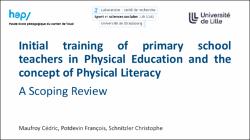Initial training of primary school teachers in Physical Education and the concept of Physical Literacy: A scoping review

Type de référence
Date
2025-05-22Langue de la référence
AnglaisEntité(s) de recherche
Résumé
In an epidemiological context of a global lack of physical activity (PA) (Strain et al., 2024), Clark et al. (2022) have shown a significant correlation between the level of physical literacy (PL) and the sustainability of PA. Elementary school is a crucial time to develop PL in a holistic way to encourage lifelong physical activity—especially as physically active children are more likely to remain active into adulthood (Telama et al., 2005). Elementary school physical education (PE), the only subject that includes all pupils in an age group, represents a key opportunity for achieving this goal. However, there are many challenges in teaching this subject (Pontais, 2024). In fact, most of these teachers are generalists (Philippot & Baillat, 2009; Randall, 2020), and many report low self-perceived competence in teaching PE (Escriva-Boulley et al., 2018). We propose a scoping review to investigate: (1) the pedagogical characteristics of elementary school PE in France during interventions, to identify what is being done to develop motor, cognitive, psychological, and social resources in accordance with the PL framework. The aim is to align pedagogical practices more closely with the epistemology underlying PL-focused interventions, in order to identify pedagogical alignment (Hatot, 2023) between the intentions and actions of primary school PE teachers. (2) the factors that support generalist teachers in delivering PE aligned with the socio-ecological framework (McLeroy et al., 1988). We conducted an electronic search across common educational science databases to identify interventions in primary PE taught by generalist teachers. Teachers involved in PE instruction often have a background in sport, have received PE training, and have substantial teaching experience. The teaching practices observed generally focus on motor, cognitive, and social aspects using traditional methods. The emotional dimension—critical for fostering dynamic interaction between all domains of the learner within a holistic vision of PL—is rarely or not explicitly targeted through stated objectives. Methods used by teachers are typically characterized by a sequence of motor games presented to students, not necessarily aligned with pedagogical objectives, suggesting a primary focus on engaging pupils. In selecting their teaching methods, teachers report a desire to motivate students. However, we found few—if any—consciously applied pedagogical strategies specific to PE that are recognized within the disciplinary field of holistic PL development. Yet, research shows that developing physical literacy requires addressing motor, cognitive, psychological, and social skills. The multiplicity of responsibilities assigned to primary school teachers in the French system (Zimmermann, 2012) makes it difficult for them to master teaching methods specific to PE. This is further compounded by an institutional emphasis on subjects like French and mathematics, which contributes to the devaluation of training in PE instruction. The aim of this review is to raise awareness among educators and institutions about the importance of developing students’ physical literacy, and to encourage institutional support that promotes the enhancement of pedagogical skills in PE teaching.Nom de la manifestation
AIESEP congressDate(s) de la manifestation
18-22 may 2025Ville de la manifestation
Saint petersburgPays de la manifestation
USA - floridaPortée de la manifestation
internationaleURL permanente ORFEE
http://hdl.handle.net/20.500.12162/8411Document(s) associé(s) à la référence
Texte intégral :
Fichier
Accès
Commentaire
Taille
- Tout ORFEE
- Détail référence



